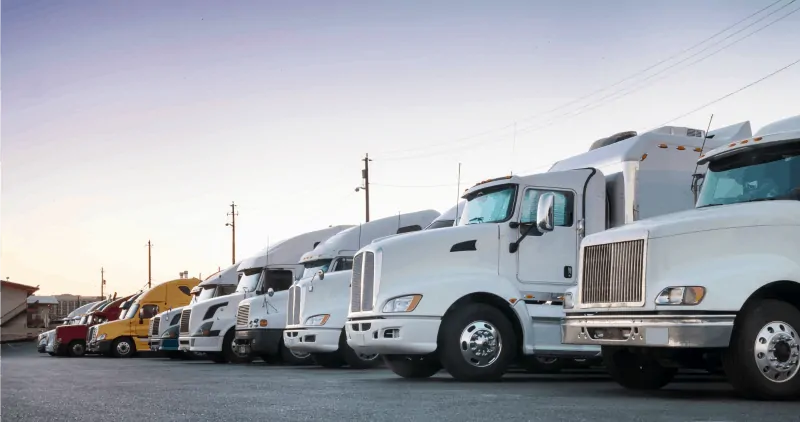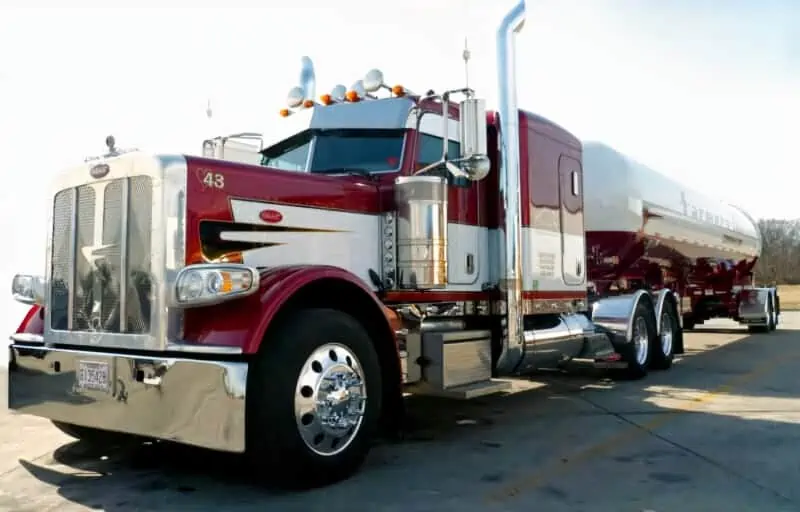Ready to take control of your truck driver pay? Discover key factors impacting your earnings and ensure you’re compensated appropriately for your hard work on the road.
Knowing If You’re Being Fairly Paid Can Be Complex
Turning the key and hitting the road might sound like a straightforward day’s work.
But as any seasoned trucker will tell you, knowing you’re getting fair pay for the work you do as a truck driver is anything but simple.
You might have a clear idea of your base salary.
But there are lots of factors that determine whether your pay genuinely reflects the work you put in.
For example, your pay statement shows mileage rates, drop and pick-up pay, waiting time (hopefully), etc.
What the Heck is ‘Good Pay’ Nowadays?
Breaking into the realm of trucking means getting familiar with a pay scale that can be as varied as the roads you’ll travel.
Knowing your worth behind the wheel comes down to understanding what influences your pay.
Besides knowing your worth, know your rights as a truck driver, concerning pay. There are standards by which trucking companies must abide to when it comes to paying you.
How Much Do Company Truck Drivers Make?
There is a very large pay range in mileage rates in each niche.
These rates are for reference purposes only. Check out the individual trucking company for accurate rates for company drivers.
- Reefer Trucking: Depth into refrigerated transport peels back layers of complexity, with seasoned haulers often landing higher-paying gigs. Those mastering temperature-sensitive deliveries boast earnings that can chill lesser experienced peers.
- .45-.55+ cents/mile
- Flatbed Hauling: Mastery over securement and tarping sets some flatbed operators apart, enabling them to command rates that reflect their honed skills and the physically demanding nature of their work. Flatbed trucking companies worth taking a closer look at, if you’re thinking of getting into this type of work.
- .50-.60+ cents/mile
- Tanker Trucking: Specialists in liquid and bulk cargo reap the benefits of their niche expertise. Higher risks and stringent regulations justify their elevated pay, a nod to the critical importance of safety in this segment. Hazmat and tanker endorsements, typically required. Tanker trucking companies worth further investigation.
- .60-.85 cents/mile
- General Freight: Drivers in general freight trucking, a vast and varied field, see a wide salary range. Veterans typically navigate toward the upper echelon, whereas newbies may need to traverse a bit before hitting a pay peak.
- .48-.55 +cents/mile
- Heavy Haul/Oversize: Experienced hands in heavy haul trucking pull significant weight—not just in cargo but also in their paycheck. Mastery over oversized loads directly translates to bulkier wallets.
- .90+ cents/mile
- LTL Trucking: LTL drivers mix road time with customer interactions, a blend warranting fair pay. Prowess in efficiency and service can propel these drivers to more lucrative lanes.
- .50+ cents/mile
How Much Do Truck Drivers Make Per Hour?
Rookie Hourly Pay: Could be as low as $15/hour to start.
Experienced drivers: $30/hr +
The difference often hinges on a mix of experience, the specific trucking sector, eg. reefer, tanker, flatbed, etc., and the region of the country where you operate.
Your Financial Stability Is On The Line
Your financial stability hinges on knowing the ins and outs of your pay as a professional truck driver.
Every driver out there has had this experience: looking at a pay stub and wondering:
- Was I paid for every mile? If so, at what rate?
- Are all of my layovers and stops included?
- Then there’s the crucial ‘unpaid hours’, eg. the mandatory H.O.S. reset on the road, costing you time and money as you sit incurring unpaid expenses.
It’s Not Just About the Money: It’s Being Recognized For Your Value
Understanding your pay structure is not just about counting pennies; it’s about recognizing your value as a professional driver.
It’s the difference between a paycheck that respects your time and experience, and one that leaves you feeling shortchanged.
What Exactly Does ‘Fair Pay’ in Trucking Mean?
- Mileage Rate Vs Actual Distance: You need clarity on the mileage rate offered and the method for calculating each trip’s distance. PC Miler and Hub mile systems are common, but methodologies vary, impacting your paycheck.
- Pickups + Deliveries: Loading, unloading, and wait times at docks contribute to your job. These should pay well, EXTRA pay. Not just eat away your hours. Companies should outline clear rates for these tasks. Scrutinize your pay stubs to ensure they’re included. If there are some missed, these add up over time. Don’t let them go if payroll fails to pay one or two.
- Detention Pay Matters: Whether it’s waiting for maintenance, mandatory rest periods, or being stuck at a shipper or receiver, compensation should be paid. If a company fails to offer this, question their definition of ‘fair’. Some trucking companies will fight this. They’ll try to nickel and dime drivers all they can here. This is crucial. Otherwise, it’s time lost by the driver without compensation.
- Tolls and Additional Fees: Expenses such as tolls and lumping fees should be transparent. Know who bears the cost and understand the reimbursement process.
- Reset Time: Hours of Service (H.O.S.) resets on the road should come with pay. Get a clear understanding of company policy, so you’re not surprised when the paycheck arrives.
- Meal and Rest Policies: During downtime, especially when on the road, whether it’s for truck repairs or mandated breaks, companies should cover meals and accommodations or allow you to spend this time at home instead.

Understand Your Pay Package (It May Not Be What You Think!)
- Mileage Isn’t The Full Story: So many drivers judge their pay package by the per-mile rate. The driver pay-per-mile rate doesn’t represent the whole picture. Assess every aspect, such as detention pay, layovers, and unload fees, to grasp the complete earnings potential.
- Benefits Count: A fat paycheck tends to lose its luster without health insurance or retirement plans. Look beyond the immediate payout. Those long-term perks are important when deciding on a truck driving job.
- Reimbursements Matter: Out-of-pocket expenses for things like scales, parking, or tolls can add up. Ensure these costs are reimbursed promptly, as they directly impact your take-home pay, especially if they’re forgotten.
- OTR vs Regional vs Local Affects Earnings: Different routes and different niches in trucking come with different challenges and pay rates. Weigh the pros and cons of over-the-road trucking vs other types of truck driving jobs, and how they affect your bottom line.
- Accessorials Add Up: Don’t overlook extra pay for extra stops or tarping. These can make a significant difference in your paycheck.
- Breakdowns and Wait Times: Your wheels aren’t always turning, but your bills don’t stop. Confirm compensation for downtime so that mechanical failures or shipping delays don’t derail your finances.
- Flexible Schedules: More time on the road means less time at home. Be sure to check out driving jobs that offer a balance.
- Contract Clarity: Never assume conditions are standard. Clarify employment details. Be sure to get things like forced dispatch and guaranteed home time clear.

Pay In Trucking Has Dropped (So We’re Chopping Yours!)
You’ve heard the rumours from other drivers in your company.
You’ve seen the gloomy headlines splashed across trucking forums: “Rates are plummeting; prepare for pay cuts.”
Now, hold it right there.
Let’s shift gears for a moment and park those rumours.
In an industry pulsating with demand, tales of declining wages often lack traction.
You work hard, navigating highways and traffic. You put up with crap on a daily basis.
Your paycheck is at stake here. Like what the hell? You’re not working any less hard!
It’s a fact that the trucking landscape is as varied as the cargo you haul.
Your Next Move? Question The Company
Dig deeper and demand details.
If a company is tightening the purse strings, question the why and how.
- Does the change apply to specific roles or services?
- Is it temporary or permanent, or are they saying, “We’re not sure”?
Arm yourself with this knowledge, and you’ll be equipped to negotiate from a position of power.
Discuss mileage, waiting times, layovers, and bonuses.
You might just find that room exists for a better deal.
Stand Firm Or Go To Where Your Skills Are Valued
Remember, driving is not just a job, it’s a professional service.
And in the business of trucking, fair compensation is not just a number—it’s your right.
Stand firm at the negotiation table, or keep rolling to where your skills are valued.
Don’t let the company grind down your paycheck without a fight.
Seek out, know, and then go after what you’re truly worth.

Type of Trucking
Specialized freight sectors, such as reefer, tanker, or flatbed trucking, often pad your paycheck a little more than general freight jobs.
It’s no surprise that a driver handling hazardous materials or oversized loads, given the additional expertise and risks involved, will see a higher pay rate than those running standard loads.
OTR, Regional + Local
- Local truck driving roles tend to pay hourly, offering stability in your schedule and income.
- OTR (over-the-road truck driver pay) driving, synonymous with longer hauls and extended time away from home, usually operates on a per-mile basis.
Yet, many OTR drivers choose this path, piecing together mileage, bonuses, and additional perks to potentially out-earn driving locally.
The bottom line? Being smart about the industry’s pay structure empowers you to steer your truck driving career in a direction that not only puts on miles but fills up your bank account.
Truck Driver OTR Mileage Rate (Range)
OTR truck drivers often wonder, what’s a competitive mileage rate?
Let’s break it down.
- Rookie OTR Rate: Average per-mile pay hovers between $0.28 and $0.40
- Seasoned veterans: $0.45 to $0.60+/Mile
These are ballpark numbers, though.
Rates fluctuate, influenced by factors like your specific driving niche, the company’s clout, and the region you’re traveling.
Don’t Knock a Few Cents/Mile: It ALL Adds Up
Let’s not beat around the bush.
At face value, a few cents might seem trivial, but when you’re hitting the 2,000-mile marker week after week, every fraction of a dollar counts.
It stacks up. A smaller pay rate could mean a sizeable chunk of change left on the table.
You want to ensure you’re not getting shortchanged, right?
With different types of freight commanding varied rates, here’s a little perspective for you: reefer trucking might have you hauling at higher rates due to the specialized handling, whereas general freight could offer less.
Heavy haul trucking, on the flip side, might bump up your pay due to the complexities involved.

Fair Pay Is Critical
Remember, a fair mileage rate is a cornerstone of a truck driver’s income.
Keep a keen eye on those pay stubs, track your miles diligently, and continuously compare with the going rates.
Arm yourself with knowledge, and you’ll find power in the numbers that truly represent your worth.
Don’t Believe Everything You Hear
You sit across from the recruiter, and their words wash over you – “Truck driver earnings are down.”
Don’t bite the bait. Myths about pay swirl through the trucking industry like tumbleweeds in the desert.
You’ve likely heard ’em all: “Everyone’s taking a cut,” or “The rates are all the same.”
Bull shit.
Markets are diverse.
Each Trucking Company Truly Pays Different Than the Next
Each trucking company sizes up compensation differently.
It’s how they package it to look appealing that differs!
Some might flaunt higher per-mile rates, but they’re serving up half-baked truths. Look closely.
Know Your Pay Package Inside and Out!
Ask pointed questions.
Get the details on the extras – layover fees, detention, and unloading might pad your pocket if you know to ask.
Pin down the specifics on mileage calculations too.
Are they using the hub mile system or software like PC Miler?
When you’re eyeing that offer, turn it inside out.
Look deep into the pay structure.
Uncover every nugget – from waiting time wages to H.O.S resets.
- Does downtime on the road mean time off or more dough?
- Will your pockets jingle for every pickup and drop, or will you be nodding off in your cab for free?
Grill the recruiter on tolls and lumping fees.
Who foots the bill?
Understand every nuance of your pay package BEFORE the rubber meets the road.
You need to get the full picture– it’s your right.
And remember, the best deals don’t just fall into your lap.
You have to chase them down.

When To Quit and Look For A Better Trucking Job
You clock in, hit the road, and drive, drive, drive. Everyday.
But are your efforts matching your paycheck?
Listen up.
Recognizing the right time to switch gears and look for a new trucking job is a skill just as critical as navigating a tight loading dock.
If you’re constantly feeling short-changed, and it’s not reflected in your bank account, it’s time to reassess.
- Stagnant Wages: If your paychecks have flatlined despite your growing experience, it’s a red flag. You deserve a rate that climbs with your skill level.
- Excessive Unpaid Hours: Watch out if hours of waiting, loading, or breakdowns lead to zero extra pay. Your time is valuable. Remember that.
- Poor Mileage Compensation: If the odometer’s spinning but your earnings aren’t, that mileage pay might not be what it should be.
- Limited Home Time: No paycheck is worth it if you’re missing out on life’s important moments. Seek balance with a carrier that respects your time off the road.
- Disregarded Concerns: You voice concerns, but they fall on deaf ears. A good employer values driver feedback and acts on it.
Your Worth Is Measured in More Than Just Miles
In trucking, your worth is reflected in respect, fair compensation, and satisfaction.
If not. The answer is clear.
Hunt for another truck driving job where you’re not just another truck number.
Trucking companies exist where your dedication is rewarded, your expertise is compensated, and you’re genuinely appreciated.
It’s not just about leaving for more money.It’s about finding a place that acknowledges your worth and provides you with the respect you have earned.
So, keep an eye on the market, talk to fellow drivers, and get ready to shift into a job that places you in the driver’s seat of your career.





